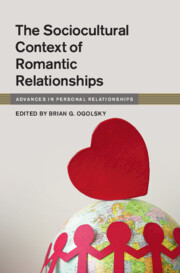Book contents
- The Sociocultural Context of Romantic Relationships
- Advances in Personal Relationships
- The Sociocultural Context of Romantic Relationships
- Copyright page
- Contents
- Contributors
- 1 The Sociocultural Context of Romantic Relationships
- 2 Systemic Racism and Romantic Relationships
- 3 Sociocultural Perspectives on Romantic Relationships
- 4 Gender and Heteronormativity in Romantic Relationships
- 5 Social Class, Neighborhoods, and Romantic Relationships
- 6 Religion and Spirituality in Romantic Relationships
- 7 The Importance of Work in Romantic Relationships
- 8 History and Cohort Effects in Romantic Relationships
- 9 The Legal Meaning of Sex (and Romantic Relationships)
- 10 Romantic Relationships and Traditional Media
- 11 Romantic Relationships and Social Media
- 12 Situating Latinx Immigrant Romantic Relationships in the Context of Illegality
- 13 Romantic Relationships during a Global Pandemic
- Index
- References
2 - Systemic Racism and Romantic Relationships
Published online by Cambridge University Press: 19 October 2023
- The Sociocultural Context of Romantic Relationships
- Advances in Personal Relationships
- The Sociocultural Context of Romantic Relationships
- Copyright page
- Contents
- Contributors
- 1 The Sociocultural Context of Romantic Relationships
- 2 Systemic Racism and Romantic Relationships
- 3 Sociocultural Perspectives on Romantic Relationships
- 4 Gender and Heteronormativity in Romantic Relationships
- 5 Social Class, Neighborhoods, and Romantic Relationships
- 6 Religion and Spirituality in Romantic Relationships
- 7 The Importance of Work in Romantic Relationships
- 8 History and Cohort Effects in Romantic Relationships
- 9 The Legal Meaning of Sex (and Romantic Relationships)
- 10 Romantic Relationships and Traditional Media
- 11 Romantic Relationships and Social Media
- 12 Situating Latinx Immigrant Romantic Relationships in the Context of Illegality
- 13 Romantic Relationships during a Global Pandemic
- Index
- References
Summary
Relationship scientists have focused on dimensions of relationship dynamics and processes including initiation, development, maintenance, and dissolution, yet most of this research is decontextualized, especially as it pertains to race and racism. Among the relationship research that accounts for race, the treatment of race as a factor to be controlled or as a comparison variable ignores the realities of racism as a system that historically influenced and continues to shape romantic relationship development and functioning. Thus, the primary aim of this chapter is to investigate how systemic racism shifts our understanding of romantic relationships by providing an integrative review and critique of the existing literature using Black romantic relationships as an exemplar. We conclude with recommendations for future relationship science across five key domains: conceptualization and theory, measurement, privilege exploration, and within-group heterogeneity.
- Type
- Chapter
- Information
- The Sociocultural Context of Romantic Relationships , pp. 7 - 28Publisher: Cambridge University PressPrint publication year: 2023
References
- 1
- Cited by



